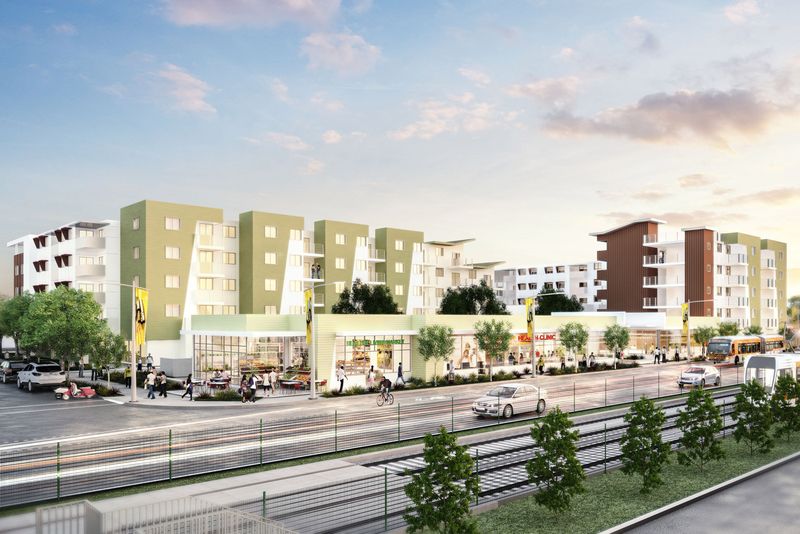
Supporters disagree
Los Angeles Mayor Eric Garcetti is joining the campaign against Measure S, highlighting how it would stymie construction of affordable housing.
The mayor joined union workers, neighborhood councilmembers, and affordable housing developers Tuesday at Casa Heiwa, a six-story affordable apartment complex in Downtown LA’s Little Tokyo neighborhood—an example of the type of low-rent apartments he said Measure S would ban.
“Measure S is not a solution,” Garcetti said. “If Measure S passes, if you think the housing crisis is bad now, it’s going to get worse.”
The ballot measure would place a two-year moratorium on some larger-scale real estate development citywide for two years. The moratorium would spare residential buildings with 100 percent affordable units—but not affordable housing projects such as Casa Heiwa, which require general plan amendments. Developers typically seek general plan amendments to rezone property or to build taller than what the plan allows.
The amendments are one of the tools “we need to build affordable housing in the city,” said Robin Hughes, CEO of affordable housing developer Abode Communities. Under Measure S, she said, “Organizations like Abode will be forced to scrap plans for hundreds of affordable housing units.”

Hughes estimated that about one-third of Abode Communities’ projects require general plan amendments.
She gave two examples, including Abode’s controversial Rolland Curtis Gardens in Exposition Park, which is taking out a 48-unit affordable complex and replacing it with a building that will hold 140 affordable units, shops, and a health clinic. The project required a general plan amendment to rezone the land for higher density, from medium residential to community commercial.
Hughes said affordable housing developers sometimes need to build bigger, because it’s the only way projects pencil out financially. “There’s economics to it as well,” she said. Sometimes, “we have to pay market rate for the land we’re buying. We need the economy of scale.”
A spokeswoman for Skid Row Housing Trust, which builds permanent housing for formerly homeless people, said the nonprofit corporation was also concerned about the measure’s restrictions.
Measure S supporters are trying to curtail large-scale development created by zoning changes and general plan amendments, in part, because they say dense buildings are ruining the character of Los Angeles.
Yes on S campaign manager Jill Stewart told the Los Angeles Times that she disputes that homeless housing projects are threatened by the measure:
Officials could move quickly to house homeless residents, she said, if they focus on developing projects on city-owned sites where homes are already permitted.
An October report from the McKinsey Global Institute found there are as many as 8,900 vacant multifamily parcels countywide.
But Garcetti said at Tuesday’s event that nine of 10 sites recently identified by the city as ideal for affordable housing would require general plan amendments.
Development is popping off in some neighborhoods, but citywide, LA’s housing supply is too low, and experts say that’s driving up the cost of rent. Daisy Villa, a mother who lives at Casa Heiwa, says living in affordable housing with discounted rent has helped her afford better food for her two children.
“I see the impact,” she said. “There are so many families right now who could benefit from affordable housing. If Measure S passes, something like this, my home, would be illegal to build.”
- Could the anti-development Measure S tank LA’s economy? [Curbed LA]
- Leonardo DiCaprio never endorsed LA’s anti-development measure [Curbed LA]
- Opponents of anti-development measure won’t claim alarming economic report was ‘independent’ [Curbed LA]
- LA’s anti-development initiative added to March ballot [Curbed LA]
- Anti-development initiative backer is LA’s top political donor [Curbed LA]
